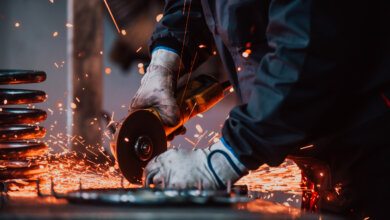Common Causes and How to Fix It: My Laptop Is Too Slow
Too Many Startup Programs Slowing Things Down
It happens to all of us. And you go to your laptop with expectations that you will be able to do something like in five minutes, yet it takes ten only to get started. Programs crash, the cursor stalls and you run out of patience. A slow computer can hurt your productivity. This is especially true when you study, work remotely, or run a business in a busy place like Sharjah.
This tutorial tells you why laptops slow and what you can do to make them fast again and when you have to take your laptop to a professional technician.
Why Is My Laptop Slowing Down?
Laptops can be viewed as any other machine they grow old, overworked and they need care. A slow laptop is not necessarily a damaged laptop or a past-dated laptop repair near me. There are cases when slight change gives it a second life.
So what are the best reasons behind poor performance and solutions that you can implement?
1. Overloaded Startup Programs
Once you turn on your laptop, there are certain auto-launching programs that you do not even have any control over. But with time you start to rack them up and they start consuming your system before you even open the browser.
2. Low Disk Space
Your laptop does not only require space to store files, but also to perform well. Windows and macOS take the space that is available to be used on virtual memory, updates, and cache files. When space runs low, everything slows down.
How to Clear Space:
-
Delete unused downloads and large files.
-
Uninstall apps you no longer use.
-
Use built-in tools:
-
Windows: “Disk Cleanup” or “Storage Sense”
-
macOS: Apple Menu → About This Mac → Storage → Manage
-
Tip: Always keep at least 20% of your total drive space free.
3. Malware and Bloatware
Reasons include viruses, spyware, and bloatware. Bloatware is unnecessary software that comes pre-installed or is downloaded. These can run in the background or transfer your data without your knowledge.
Warning Signs:
-
Frequent pop-ups
-
Browser redirects
-
High CPU usage without open apps
Solutions:
-
Run a full antivirus/malware scan.
-
Use a trusted malware removal tool like Malwarebytes or Windows Defender.
-
Remove unnecessary toolbars and browser extensions.
4. Outdated System Software
Performance and Security – operating systems or the software may be causing a problem with outdated drivers. The newer applications are designed to be used with newer updates whereas with the older systems they may fall behind.
5. Not Enough RAM
The thing your laptop uses to keep programs running is RAM (Random Access Memory). If you have 4GB of RAM or less, you might struggle to run heavy apps. This includes Chrome, Excel, Photoshop, and Zoom.
What Can Help:
-
Close unused browser tabs and background apps.
-
But if your system is able to then do at least 8GB RAM.
-
For those heavy .9ibtaling tasks like videediting or gaming then you should have 16GB or mor.
6. Using a Traditional Hard Drive (HDD)
Lots of old laptops have mechanical hard drives and they can be teased very slowly compared to SSDs (Solid State Drives). In the event that it requires more than a minute to boot your laptop, then you might be having a bottleneck in your HDD.
Solution:
-
Upgrade to an SSD. It’s one of the most effective ways to speed up any laptop repair in Sharjah.
-
SSDs offer:
-
Faster boot and load times
-
Better durability
-
Lower power consumption
-
You can make a clone of your old HDD onto a new SSD and thus retain all your files and system settings.
7. Too Many Tabs or Browser Extensions
When navigating internet, we can easily open several tabs, each one of them taking memory. Introduce browser add-ons such as an ad-filter, a password manager, or a shopping add-on, and the load will go up.
Smart Browsing Tips:
-
Use of book mark tabs and close them when you are not using them.
-
Only make extensions to the limits that are essential.
-
Go with browsers such as Brave or Firefox which are lite when compared to Chrome.
8. Overheating and Dust Buildup
In Sharjah’s hot climate, laptops are prone to overheating — especially if the vents are blocked or dust accumulates inside.
Signs of Overheating:
-
Fan running constantly or loudly
-
Laptop shuts down unexpectedly
-
Slow performance after short use
Prevention:
-
Keep your laptop on a hard, flat surface.
-
Avoid using it on beds or cushions.
-
Clean air vents with compressed air.
-
Service the cooling system once a year.
9. Cluttered Desktop and File System
A messy desktop or file structure will hold back on file indexing & interactive window processes. The more icons and lots of files on the desktop, the more time it will need to search where it is.
Tidy Up:
-
Save files in a folder instead of the desktop.
-
Rephrase: obsolete screenshots/D Dokumente.
-
Organize by date or category.
10. Too Many Background Services
Some apps keep working in the background, even after you close their window. They handle tasks like cloud syncing, checking for updates, and running voice assistants.
To Manage:
-
To see the processes that are running, open up Task Manager (Windows) or Activity Monitor (Mac).
-
Uninstall or disable the services you do not use.
-
Advanced startup control: utilize such tools as MSConfig (Windows).
When Should You Consult a Technician?
If you’ve tried all the above solutions and your laptop is still slow, there might be bigger problems. The following are indicators of possible need of professional help:
-
Hard Drive Failure: Sounds of a clicking or buzzing coming from the drive.
-
Corrupt OS: Lots of crashes or Blue Screen of Death (BSOD).
-
Faulty RAM or motherboard: Random shutdowns or It beeps while booting.
-
Battery Swelling or Damage: Physical bulging or overheating.
Many local technicians in Sharjah can help with hardware upgrades. They can install SSDs, clean thermal paste, and provide a full system overhaul. Some even offer pickup and drop-off services.
Proactive Tips to Keep Your Laptop Fast
-
Restart your laptop once a week. This helps clean the memory and close background processes.
-
Do not use a great number of apps just as you do not need them.
-
Perform regular backupsof files and monthly system cleanups.
-
Try a lightweight app like Office Online or Google Docs. They are easier to use than heavier desktop applications.
-
If you have to work with the laptop very long, invest in cooling pads or reselling keyboards.
Final Thoughts
It is not always the case with a slow laptop that it is time to get a new one. It often happens because of full memory, being outdated, or an ignored destination. With some easy upkeep tips and smart use, you can make your laptop feel new again. Try upgrading it by adding a new SSD or increasing the RAM. If you work in Sharjah or nearby, keep an eye on dust, ventilation, and regular system check-ups. This care can really boost your machine’s health and responsiveness.




